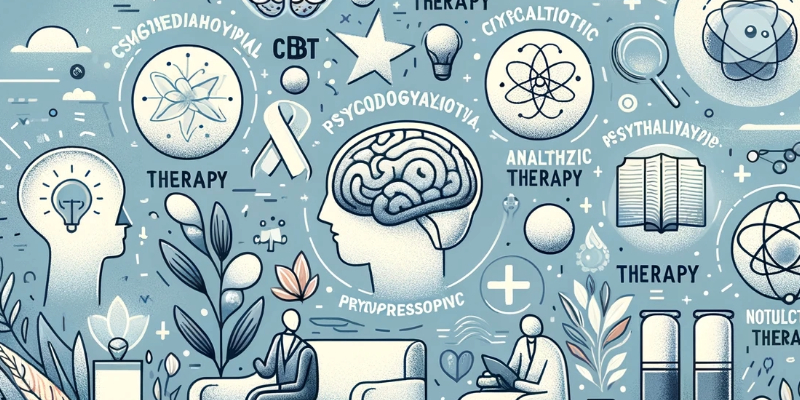Depression, one of the most common mental disorders of our time, affects millions of people worldwide, regardless of age, gender, or social status. Prolonged feelings of sadness, lack of interest in daily activities, and chronic fatigue are some of the symptoms that can significantly reduce your quality of life. Fortunately, there are many therapeutic methods that can help combat this debilitating condition. In this article, we will look at different approaches to treating depression, from cognitive behavioral therapy to interpersonal therapy and modern methods of pharmacotherapy and electroconvulsive therapy. Each of these methods has its own unique advantages and can be adapted to the individual needs of the patient, offering hope for mental and emotional recovery.
Cognitive Behavioral Therapy (CBT)
Cognitive behavioral therapy, known as cognitive behavioral therapy, is one of the most recognized and effective approaches to treating depression. CBT focuses on the relationship between thoughts, feelings, and behaviors, helping patients identify and change negative thinking patterns and actions that contribute to depression.
How does CBT work?
CBT is based on the assumption that our thoughts influence our emotions and behavior. People with depression often have negative thoughts that can lead to feelings of hopelessness and helplessness. CBT helps patients understand that these thoughts are distorted and do not necessarily reflect reality.
Key components of CBT
- Cognitive reconstructionThis process involves identifying and challenging negative thoughts and replacing them with more realistic and positive thoughts. Patients learn to change their thinking so that it has a beneficial effect on their emotions and behavior.
- Behavioral activation: Depression often leads to a lack of activity and social isolation, which can worsen the condition. Behavioral activation consists of gradually increasing the patient's involvement in positive and constructive activities. The therapist helps the patient plan and perform daily activities that can bring satisfaction and improve their mood.
- Learning coping skills: CBT equips patients with practical methods of dealing with difficult situations and stressors. These are, for example, relaxation techniques, problem-solving strategies, or stress management techniques.
- Homework: In CBT, patients are often given tasks between therapy sessions. These can be thought logs, task lists, or exercises to practice new skills. Homework is a key component of therapy because it allows patients to apply new strategies in their daily lives.
Numerous studies confirm the effectiveness of CBT in the treatment of depression. This therapy is particularly effective in reducing depressive symptoms and preventing relapses of the disease. CBT can be used both in the form of individual and group therapy, as well as in combination with pharmacotherapy, which often gives the best results.
Cognitive behavioral therapy is a powerful tool in the fight against depression. By focusing on changing negative thoughts and behaviors, CBT helps patients regain control of their lives and improve the quality of their daily functioning. Understanding and applying CBT principles can bring significant relief to people suffering from depression, offering them a real chance of recovery.
Psychodynamic therapy for treating depression
Psychodynamic therapy is one of the classic approaches to treating mental disorders, including depression. Based on the theory of psychoanalysis, psychodynamic therapy focuses on the study of unconscious processes and internal conflicts that can influence a patient's thoughts, emotions, and behavior.
How does psychodynamic therapy work?
Psychodynamic therapy is based on the assumption that our current behavior and feelings are strongly shaped by past experiences, especially those of childhood. The therapy process involves discovering these unconscious patterns and understanding how they affect current mental health problems, including depression.
Key components of psychodynamic therapy
- Exploring unconscious thoughts and feelings: The therapist helps the patient identify and become aware of unconscious thoughts and feelings that may contribute to depression. This process often involves analyzing dreams, making free associations, and understanding past experiences.
- Analysis of interpersonal relationshipsPsychodynamic therapy often focuses on understanding patterns of interpersonal relationships. The therapist and patient study how previous experiences with important people affect current relationships and how they can contribute to depression.
- Transmission and transmission: An important component of therapy is the phenomenon of transmission, where the patient transmits feelings and expectations related to important people from the past to the therapist. Analysis of this transfer allows us to better understand the emotional reactions of the patient.
- Working on internal conflicts: Therapy focuses on identifying and resolving internal conflicts that can be a source of depression. This may include conflicts between desires and responsibilities, needs and reality, or between different aspects of the patient's personality.
Research shows that psychodynamic therapy can be effective in treating depression, especially in cases where depression is associated with deep, long-term emotional and relational problems. Patients often report improvements in self-awareness, interpersonal relationships, and ability to cope with emotions.
Psychodynamic therapy offers a deep understanding of the internal mental processes and interpersonal relationships that can contribute to depression. By focusing on unconscious thoughts and feelings, as well as patterns of the past, this therapy allows patients to discover and solve deep-rooted problems. This is an approach that, while it takes time and commitment, can lead to permanent changes and improvements in the quality of life of people with depression.
Analytical therapy for treating depression
Analytical therapy (View moreOften identified with deep psychoanalysis, it is a therapeutic technique that focuses on uncovering the unconscious thoughts and processes that influence a patient's emotions and behavior. Analytical therapy, created by Sigmund Freud and later developed by other psychologists such as Carl Jung, is one of the most comprehensive approaches to treating depression.
How does analytical therapy work?
Analytical therapy is based on the belief that many of our emotional problems arise from unconscious conflicts that have arisen as a result of previous experiences, especially in childhood. The goal of therapy is to bring these unconscious processes to consciousness, allowing them to work and understand them.
Key elements of analytical therapy
- Understanding unconscious processes: The therapist helps the patient understand and become aware of unconscious thoughts, feelings, and memories. This process often involves analyzing dreams, associations, and various forms of symbolism that can reveal hidden conflicts.
- Analysis of defense mechanisms: In analytical therapy, much attention is paid to identifying and understanding the defense mechanisms that the patient uses to protect against unconscious conflicts. These mechanisms, such as displacement, projection, or rationalization, may contribute to maintaining symptoms of depression.
- Moving jobs: As in psychodynamic therapy, transmission is a key component of analytical therapy. The patient communicates feelings and expectations from important past relationships to the therapist. Analyzing this transfer provides a better understanding of the patient's internal conflicts and relational models.
- Expressing and integrating emotionsAnalytical therapy aims to allow the patient to fully survive and express repressed emotions. Integrating these emotions into the patient's mind is a key step in the treatment process, leading to a reduction in symptoms of depression.
- Developing self-awareness and autonomyThe ultimate goal of analytical therapy is to help the patient develop deep self-awareness and autonomy. By understanding their unconscious motivations and conflicts, the patient can better manage their life and make informed decisions.
Analytical therapy, although often long and intensive, can lead to profound and permanent changes in the patient's psyche. Research shows that analytical therapy can be effective in treating depression, especially in cases where depression is associated with long-term, deep-rooted emotional and relational problems.
Analytical therapy offers an in-depth approach to treating depression, focusing on the unconscious processes and conflicts that affect the patient's emotions and behavior. By discovering and working on these deep-rooted problems, this therapy enables patients to achieve sustained improvements in quality of life and greater self-awareness. Although it takes time and commitment, analytical therapy can be an extremely valuable tool in the fight against depression.
Eclectic treatments for depression
Eclectic therapy is a therapeutic approach that combines elements of various therapeutic methods to adapt treatment to the individual needs of the patient. In the context of depression, eclectic therapy may include cognitive behavioral therapy (CBT), psychodynamic therapy, humanistic therapy, and other approaches to provide the most effective and holistic treatment.
How does eclectic therapy work?
The eclectic approach is not limited to a single theory or method, but selects the most effective methods from various therapeutic schools. An eclectic therapist evaluates a patient's unique needs and uses appropriate techniques that are best suited to their specific problems and therapeutic goals.
Key elements of eclectic therapy
- Individual approach: The therapist creates a personalized treatment plan that takes into account the patient's unique needs, goals, and preferences. This may involve a combination of different methods and therapeutic strategies.
- Flexibility and adaptability: Eclectic therapy is flexible and can be adapted during treatment in response to the changing needs of the patient. The therapist can introduce new methods or modify existing methods to better support the patient.
- A combination of different techniques: The therapist can combine cognitive-behavioral techniques (e.g., cognitive reconstruction, behavioral activation) with elements of psychodynamic therapy (e.g., analyzing unconscious conflicts, working on transference) and humanistic techniques (e.g., acceptance and commitment, exploring one's own values).
- Holistic approach: Eclectic therapy takes into account both the mental, emotional, and social aspects of the patient. The therapist takes into account the overall experience of the patient and works on all aspects of their life that may affect depression.
Research shows that an eclectic approach can be very effective in treating depression, as it allows you to flexibly adapt therapy to the individual needs of the patient. This allows patients to receive more personalized and comprehensive support, which increases the chances of therapeutic success.
Eclectic therapy offers a unique approach to treating depression, combining elements of different therapeutic methods to tailor treatment to the patient's specific needs. With flexibility and a holistic approach, eclectic therapy can effectively support patients in their fight against depression, helping them better understand themselves and improve their quality of life.
Diabetic therapy to treat depression
Notetic therapy, also known as Bible counseling or notetic counseling, is a therapeutic approach that draws on Biblical teachings and Christian principles to address emotional and mental issues, including depression. The name comes from the Greek word "noutheteo", which means" to exhort "or"to exhort". This therapy assumes that the Holy Scriptures contain all the necessary guidance and wisdom needed to solve life's problems.
How does diabetic therapy work?
Diabetic therapy is based on three basic principles::
- Teaching: The therapist (often a clergyman or a qualified Christian counselor) uses the Holy Scriptures to teach the patient Christian principles and values that can help them cope with emotional problems.
- Reminder: The therapist helps the patient identify and understand the sins and mistakes in their life that may contribute to mental health problems, including depression.
- Change: The goal of therapy is to make permanent changes in the patient's life by applying biblical principles and teachings to daily life, which should lead to spiritual healing and better mental health.
Key elements of diabetic therapy
- Bible BasicsQuestioner: Hypothetical therapy is based on the assumption that the Holy Scriptures are the ultimate authority on matters of faith and life. Therapists use passages from the Bible to give patients wisdom and guidance on how to deal with depression.
- Spiritual healing: Therapy focuses on the spiritual aspect of the patient's health, suggesting that spiritual healing and a renewed relationship with God can lead to an improvement in emotional and mental health.
- Individual approach: Diabetic consultants adapt their methods to the individual needs of the patient, taking into account their personal beliefs, experience and life situation.
- Cooperation with the local church: Therapy is often performed in collaboration with the local church, which provides additional social and spiritual support to the patient.
The effectiveness of diabetic therapy may vary depending on individual beliefs and the patient's commitment to the Christian faith. People who deeply identify with the Christian faith can find valuable support and comfort in this therapy. Diabetic therapy can help patients better understand themselves, their faith, and make positive changes in their lives.
Diabetic therapy offers a unique approach to treating depression based on biblical teachings and Christian values. Through teaching, exhortation, and making changes in accordance with biblical principles, this therapy seeks to heal patients spiritually and emotionally. While not suitable for everyone, it can be particularly effective for those who are deeply connected to the Christian faith, offering them hope and support in their fight against depression.
Pharmacotherapy
Pharmacotherapy it includes the use of antidepressants, such as:
- Serotonin reuptake inhibitors (SSRIs): for example, fluoxetine, sertraline.
- Norepinephrine and serotonin reuptake inhibitors (SNRIs): for example, venlafaxine, duloxetine.
- Tricyclic Antidepressants (TCA): for example, amitriptyline, imipramine.
Medications can be used alone or in combination with psychotherapy, depending on the severity of symptoms and the individual needs of the patient.
Resume
Depression is a serious and complex mental disorder that can significantly reduce the quality of life of a person suffering from this condition. There are many different therapeutic approaches that can help combat depression, each with its own unique benefits and can be tailored to the individual needs of the patient.
Cognitive behavioral therapy (CBT) focuses on changing negative thinking patterns and behaviors that contribute to depression. Psychodynamic therapy explores unconscious processes and past experiences to understand and resolve internal conflicts. Analytical therapy goes deeper by analyzing the unconscious thoughts and emotions that affect our behavior and well-being. Eclectic therapy combines elements of various therapeutic methods to tailor treatment to the specific needs of the patient. Diabetic therapy, in turn, is based on Christian principles and uses the Holy Scriptures to solve emotional and mental problems.
Each of these treatments offers different tools and techniques that can help patients cope with depression and improve their quality of life. Choosing the right therapeutic approach is crucial and must be tailored to the individual needs and beliefs of the patient.
Invitation to the Adjutant Therapy Center
If you or a loved one is struggling with depression, we invite you to Adjutant Therapy Center. Our team of experienced therapists offers a variety of therapeutic approaches, including CBT, psychodynamic therapy, analytical therapy, eclectic therapy, and kinetic therapy. At Adiuta, we believe that everyone deserves an individual approach and support on their journey to mental health.
Contact us today to make an appointment for a consultation and start your journey to feeling better. Together, we will find the best therapeutic method that will help you regain the joy and fullness of life.
Welcome to the Adjutant Therapy Center-your mental health is a priority for us.







